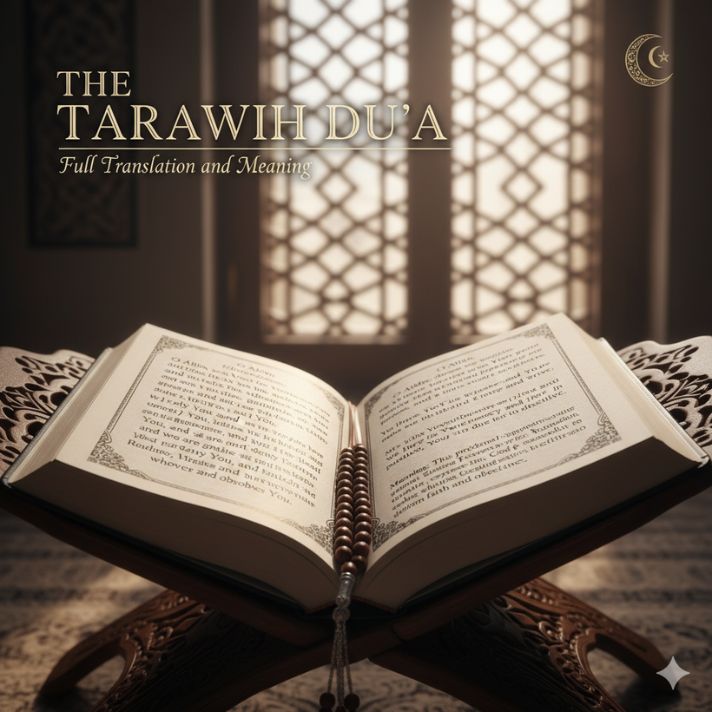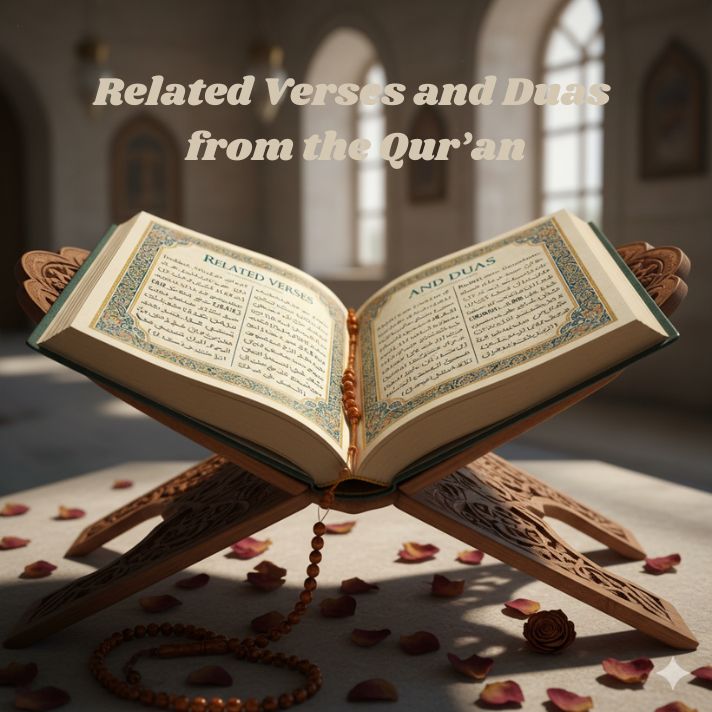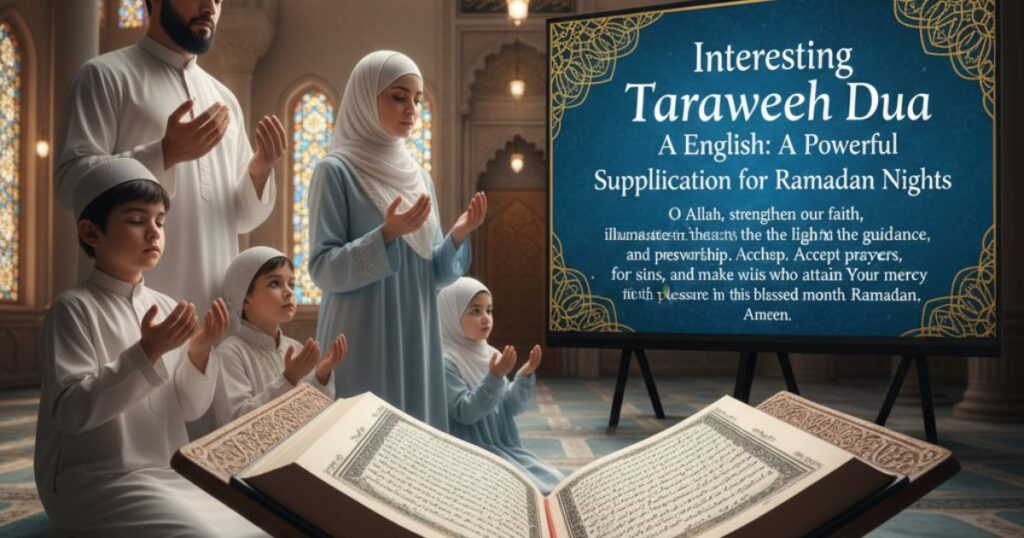Ramadan nights bring peace, reflection, and special prayers for Muslims around the world. One of the beautiful moments is reciting the Taraweeh Dua in English, a short prayer that touches the heart and builds up the connection with Allah. It adds calm and focus to the night prayer.
This dua may not be part of the Prophet Muhammad ﷺ’s Sunnah, but it carries deep meaning. Worshippers often recite it after a few rak‘ahs of Taraweeh, blessing Allah’s greatness and asking for protection from Hellfire. Its simple words make it easy to remember and recite, even for beginners.
Many people find that reading the Taraweeh Dua in English helps them understand the prayer better. It reminds us why we pray, to turn back to Allah, seek His mercy, and feel closer to Him during the holy nights of Ramadan. It’s short, sincere, and powerful.
What Is the Taraweeh Dua in English?
The Taraweeh Dua in English is a short, heartfelt supplication recited during Ramadan nights. It is not part of the Prophet ﷺ’s Sunnah, but it helps worshippers feel a deep spiritual connection. People often recite it after a few rak‘ahs of Taraweeh, praising Allah’s greatness and asking for protection from Hellfire.
Even though this dua is not obligatory, it carries meaningful words that reflect hope, humility, and sincere devotion. By reciting it in English, non-Arabic speakers can understand its meaning clearly. It creates a moment of reflection and helps strengthen faith during the special night prayers of Ramadan.
The Taraweeh Dua in English – Full Translation and Meaning

The Taraweeh Dua praises Allah’s greatness and asks for His protection from Hellfire. Many worshippers find it easy to memorize, and reciting it in English helps deepen their spiritual connection.
Here is the commonly recited Taraweeh Dua in English:
Exalted is the Possessor of the hidden and the manifest dominion.
Exalted is the Possessor of Might, Greatness, Reverence, Power, Pride, and Majesty.
Exalted is the Master, the Living, the One who neither sleeps nor dies.
All-perfect, All-holy, our Lord and the Lord of the angels and the souls.
O Allah, grant us refuge from the Hellfire.
O Granter of refuge, O Granter of refuge, O Granter of refuge.
This dua lauds Allah’s eternal power and supremacy. The first lines acknowledge that Allah controls everything, seen and unseen. The repetition of “O Granter of refuge” shows sincerity and urgency in seeking protection from Hellfire. It reminds worshippers of modesty, hope, and dependence on Allah.
Explanation:
- “Exalted is the Possessor of the hidden and the manifest dominion”
Allah rules over everything, both known and unknown. - “Exalted is the Possessor of Might, Greatness, Reverence, Power, Pride, and Majesty”
We praise Allah’s elevated attributes. - “Exalted is the Master, the Living, the One who neither sleeps nor dies”
Allah is eternal, always aware, never resting. - “All-perfect, All-holy, our Lord and the Lord of the angels and the souls”
He is pure, holy, and the Master of all creation. - “O Allah, grant us refuge from the Hellfire”
A sincere request for protection from punishment. - “O Granter of refuge, O Granter of refuge, O Granter of refuge”
Repeating the plea highlights loyalty and urgency.
This dua is short, real, and easy to understand. It creates a strong spiritual connection, making Taraweeh prayers even more meaningful. Many worshippers feel peace and hope when they recite it.
Even if you don’t know Arabic well, reading the Taraweeh Dua in English helps you reflect on its meaning. It reminds us to praise Allah, seek His mercy, and turn to Him with humility and sincerity during the holy nights of Ramadan.
Is This Dua from the Sunnah? What Scholars Say
Many people wonder if the Taraweeh Dua in English is from the Sunnah of the Prophet ﷺ. The truth is, this exact dua is not found in the hadith books. Scholars clarify that the Prophet ﷺ did not teach this specific prayer after Taraweeh prayers.
However, Islamic scholars agree that dua with good meanings is allowed. Sheikh Ibn Uthaymeen stated that non-obligatory duas blessing Allah’s attributes and asking for protection are allowed as long as they are not considered compulsory. The key is sincerity, not habit enforcement.
Other scholars, like Shaykh Al-Albani, highlight that reciting meaningful duas can build up faith. While the Taraweeh Dua is not prophetic, its words align with Qur’anic guidance about seeking refuge from Hellfire and praising Allah’s power, which makes it spiritually valuable.
Imams in many masjids around the world often include this dua as a pause in the night prayer. It is used for reflection and spiritual connection rather than responsibility. Scholars like Dr. Yusuf al-Qaradawi encourages understanding such practices as cultural expressions of faith that inspire loyalty.
In short, the Taraweeh Dua is not from the Sunnah, but scholars allow it because it has sound meaning, encourages sincere worship, and helps Muslims connect with Allah during Ramadan nights. It should be recited with awareness, not treated as required or compulsory.
Even though it is not prophetic, many scholars highlight that the Taraweeh Dua serves as a tool for spiritual reflection. By praising Allah’s credit and asking for protection from Hellfire, worshippers strengthen their hearts and minds during Ramadan nights, making their Taraweeh prayers more meaningful and heartfelt.
When and How It’s Recited in Taraweeh
This Dua is usually recited during the night prayers of Ramadan, often after every four rak‘ahs of Taraweeh. Some imams recite it quietly, while others say it aloud for the whole followers. It serves as a gentle pause for reflection and spiritual connection.
Worshippers can also recite the dua silently at home. Keeping a written or digital copy helps focus on the meaning of the words. Even non-Arabic speakers can engage deeply, understanding the blessing of Allah’s greatness and the request for refuge from Hellfire.
The recitation begins by praising Allah’s credits. Each line acknowledges His majesty, power, and eternal nature. Then it transitions into the heartfelt plea: “O Allah, grant us refuge from the Hellfire.” Repeating “O Granter of refuge” three times highlights sincerity and loyalty.
There is no fixed rule for its frequency. Some masjids say it after every four rak‘ahs, others at the end of all Taraweeh prayers. Individuals can adjust according to personal comfort, as the main goal is a deep spiritual experience and reflection during the holy nights of Ramadan.
Finally, the dua is flexible. Whether recited in Arabic, English, or a combination, it allows worshippers to connect with Allah with reality. This practice encourages mindfulness, humility, and a sense of spiritual renewal, making Taraweeh prayers more meaningful and heartfelt every night.
The Authentic Qunoot Dua of Witr

The Qunoot Dua of Witr is an original prayer taught by the Prophet ﷺ. It is recited in the last rak‘ah of Witr prayer, either before or after bowing. This dua praises Allah, asks for guidance, protection, and blessings, and builds up the spiritual connection of worshippers.
Translation of Qunoot Dua (from the Sunnah):
“O Allah, guide us among those You have guided,
grant us well-being among those You have granted well-being,
take us into Your care among those You have taken into Your care,
bless us in what You have given,
and protect us from the evil of what You have decreed.
For You decree and none can decree over You.
He whom You support will never be humiliated,
and he whom You oppose will never be honored.
Blessed are You, our Lord, and Exalted.“
The Qunoot Dua is very important because it is directly from the Prophet ﷺ. Reciting it ensures that worshippers follow the Sunnah, gaining spiritual rewards and guidance. It reminds Muslims to seek Allah’s protection and blessings with sincerity and modesty.
Additionally, this dua strengthens faith by connecting daily prayer routines with the teachings of the Prophet ﷺ. It encourages unity in night prayers, reflection on life, and reliance on Allah’s mercy and guidance, making it a core part of Ramadan and Witr worship.
Why Muslims Still Hold on to the Taraweeh Dua
Many Muslims continue to recite the Taraweeh Dua in English because it creates a moment of spiritual reflection during Ramadan nights. Its words praise Allah’s greatness and remind worshippers to seek protection from Hellfire, making the Taraweeh prayers more heartfelt and meaningful.
The dua also feels close and comforting. Worshippers often grew up hearing it in masjids or at home. This habit builds up their faith connection and encourages sincere loyalty, even if the prayer is not part of the Sunnah. It becomes a spiritual rhythm for many.
Finally, the Taraweeh Dua is simple and easy to memorize. Its repetition highlights humility, hope, and dependence on Allah, helping worshippers express their personal feelings during prayer. This dua continues to hold a special place in the hearts of Muslims worldwide.
Related Verses and Duas from the Qur’an

The Taraweeh Dua reflects meanings supported by the Qur’an. Many verses highlight praising Allah, seeking guidance, and asking for protection from Hellfire. Reciting these verses during Ramadan nights builds up faith and deepens the spiritual connection with Allah.
- “Say: O Allah, Owner of the dominion. You give sovereignty to whom You will…” Surah Aal-Imran 3:26
- “Our Lord, indeed whoever You admit to the Fire, You have disgraced him…” Surah Aal-Imran 3:192
- “O our Lord, do not cause our hearts to deviate after You have guided us…” Surah Aal-Imran 3:8
- “Our Lord, give us good in this world and good in the Hereafter, and protect us from the punishment of the Fire.” Surah Al-Baqarah 2:201
- “And those who say, ‘Our Lord, grant us from among our wives and offspring comfort to our eyes and make us an example for the righteous.’” Surah Al-Furqan 25:74
These verses remind us to turn to Allah sincerely and seek His mercy. They guide worshippers to pray meaningfully and connect deeply during Taraweeh and Ramadan nights.
Final Thoughts and a Closing Supplication
In conclusion, the Taraweeh Dua in English offers a short, heartfelt way to connect with Allah during Ramadan nights. It blessed His greatness, seeks protection from Hellfire, and encourages real reflection. Even though it is not from the Sunnah, it builds up faith, provides comfort, and helps worshippers feel closer to Allah.
Reciting it, understanding its meaning, and reflecting on related Qur’an verses creates a powerful spiritual experience. Whether in masjids or at home, this dua allows Muslims to express modesty, hope, and loyalty during the holy nights of Ramadan.
Closing Dua:
“O Allah, forgive our sins, accept our prayers, guide us on Your path, and grant us refuge from the Hellfire. Ameen.”
This closing dua beautifully sums up the essence of the Taraweeh Dua, reflecting humility, hope, and loyalty. It allows worshippers to sincerely ask for guidance, forgiveness, and protection during the blessed nights of Ramadan.
Frequently Asked Questions (FAQs)
Is the Taraweeh Dua a Sunnah?
No, the Taraweeh Dua is not from the Sunnah, but it is allowed because its meaning is sound and sincere.
Can I say the Taraweeh Dua in English at home?
Yes, you can recite it at home. Understanding the meaning in English builds up your spiritual connection with Allah.
Do I have to say this dua after every four rak‘ahs?
No, there is no rule. You may recite it after four rak‘ahs or at the end of Taraweeh prayers.
What’s the difference between this dua and the Qunoot Dua?
The Qunoot Dua is from the Sunnah, taught by the Prophet ﷺ, while Taraweeh Dua is a heartfelt,optional prayer.
Can I recite my own dua during Taraweeh?
Yes, you can say your own dua. Taraweeh allows personal prayers as long as you are sincere and humble.
Read More Articles: Msgsword



